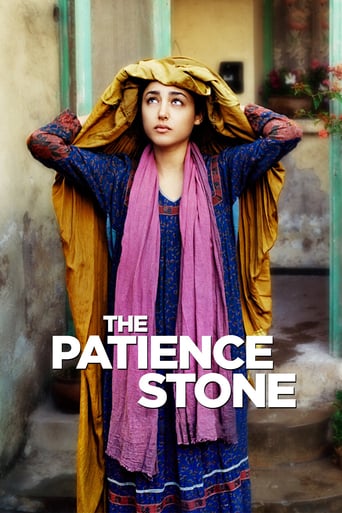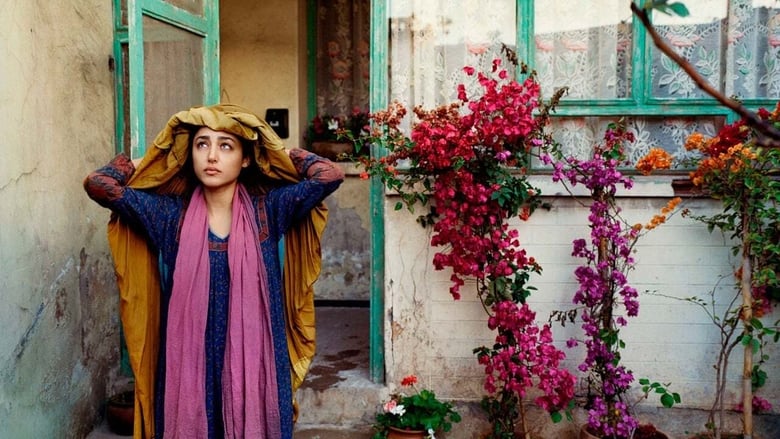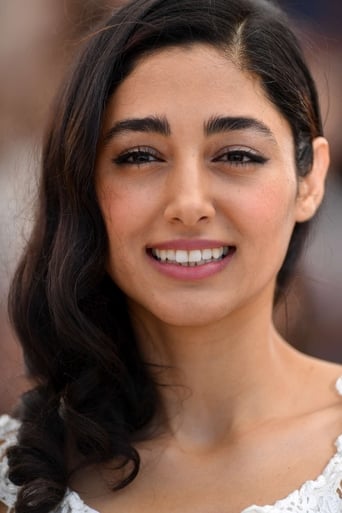

The Patience Stone (2013)
In a war ridden country a woman watches over the husband reduced to a vegetable state by a bullet in the neck, abandoned by Jihad companions and brothers. One day, the woman decides to say things to him she could never have done before.
Watch Trailer
Cast


Reviews
Man, does this sound like a loser -- a woman tends her unconscious husband at home and heaps all of her grief and sorrow on the poor guy's insensible bald head. A Lifetime Movie Network special, right? But no! I was caught up in it at once and couldn't break away. The wife is in her mid-thirties and, while by no means glamorized, has attractive features, striking. Somebody should paint her portrait. But nobody will because she, her older husband, and their two little girls live in a shabby apartment in some unnamed city in the Middle East. They depend on a water bearer, who may or may not show up because the dusty streets are dangerous, what with the militia on one side and the rebels on the other. They have no electricity either and live by lamplight at night, when they dare turn it on at all.If she goes out, she wears a mustard-colored burqa, which had always impressed me as a heavy garment made of something like canvas but is actually a thin, silken, all-around cape that's easily slipped back onto the shoulders. The woman has few friends -- one of her neighbors has gone round the bend because the men of her house have been slaughtered and hung upside down -- and her only relative is an older aunt who runs a whorehouse. There is a Mullah who knocks at the gate from time to time but he's extremely demanding and his predictions are wrong, so she turns him away.After the first two or three minutes, it lost any resemblance to a Lifetime Movie Network special. When the rebels (or the militia, I couldn't tell which) break into her apartment, she hides the wounded husband in a cubby hole to keep him from being killed. When the two armed and ugly men begin to take an interest in her she lies and claims to be one of her aunt's prostitutes, which disgusts the men to the extent that they leave her impure body alone. Well, except that the younger of the two -- an inexperience young man with a stutter -- returns later, flings a handful of bills on the floor, throws her down among them, pulls off their hampering undergarments, and achieves intromission and ejaculation at almost the same instant. "Is this your first time?", she asks wonderingly, and he nods.Thereafter he appears with some regularity desiring her services. He even secretly leaves a small bandanna-wrapped pile of food on their window sill. He's gotten to kind of like her, despite her professed profession. She rather appreciates his coming too -- not just for the money, which buys them food and water, but because he's so shy and inexperienced that she can guide him in foreplay and tell him what to do to give her pleasure. She begins to groom herself more carefully and, anticipating his arrival, she dresses in becoming clothes instead of her usual rags.That brings us back to the balding husband, flat on his back, a bullet in his neck, the result of a personal quarrel. She's keeping him alive through a tube running from a drip sack nailed to the wall -- just water and sugar. And just how did hubby treat her, even since he married her when she was fifteen? Like an animal. The more beans she spills, the more we realize how complicated, how adversarial, their relationship was. He'd never kissed her or fondled her. The woman's job was to produce children. After the first months of their marriage, his family began to think she was sterile, when in fact it was he who was shooting blanks. Consequently, she allowed herself to be secretly impregnated by two other men.The title, "The Patience Stone," refers to a legend in which a character confesses all her grief to a stone and when the stone finally shatters, she's freed of all her guilt and sorrow. It plays into the movie's climactic scene, which I won't describe.The acting is as good as it is in any Hollywood movie, the setting is evocative, and all the elements fit together properly. It's pretty well done. You're not likely to be bored.But I have to add two observations. The voices tell me to do it. I know two anthropologists who have done field work in Middle Eastern cultures. One told me that she'd met a middle-aged lady who had never had a period because she was constantly made pregnant by her husband. Another told me that the burqa is not a particularly good way of hiding a woman's beauty from the boys on the street corners, who sometimes whistled when a woman wearing a tent passed by. They muttered, "Wow -- look at those FEET!" And why not? The feet are the windows of the soul. So it is written.
This unusual war film, based on the novel of the same name that won the Prix Goncourt 2008, was brilliantly adapted to the screen by author Atiq Rahimi (Earth and Ashes, 2004) himself, in collaboration with his friend, the legendary scenarist, Jean-Claude Carrière.In Persian folklore, there exists a magic black stone, Syng-e-saboor (the Patience Stone), to which one can confide everything. The stone listens, soaking in all the words, the secrets, the miseries, until it finally explodes, and on that day, one is instantly delivered of all one's sufferings and worries.In ruined Kabul, rival bands of mujahidin are fighting like rabid dogs over the remnants of the city. In this apocalyptic world, a man lies comatose on a mattress in a bare room of his house. His wife kneels next to him, fingering her prayer beads and talking to him. She recalls episodes of her life. Her voice, timid and hesitating at first, affirms itself. She finally lets bitter words, crazy words, holed up far too long, escape from her inner self. She heckles Allah and his Hell, insults men and their never-ending wars, curses her warrior husband, a hero vanquished by his male pride, his religious obscurantism, his hate of the other, and goes as far as to reveal her most inner thoughts and secrets. In doing so, she frees herself from the marital, social and religious oppressions she has been enduring the whole of her life. Once quietly praying, now she screams. Once living in silence and self- sacrificing abnegation, she emerges now as a human being, a woman. The adaptation to the screen was a significant challenge, given that it is a tragic huis clos taking place in the sick room, which The Woman (we never learn any of the characters' names) only occasionally leaves. The book is a monologue by a woman to a dying man. Its delivery is straightforward: the voice speaks as if the woman is writing. Translating this narrative to the screen was something else, and the challenge depended on the choice of a very special actress whose theatrical talent would allow her to embody the role of The Woman on whom the whole film so critically depends. Rahimi chose the young Iranian actress, Golshifteh Farahani. Born in Iran after the revolution, she knows what it means to live in a phallocratic society. This was not a sine qua non pre-condition for the part, but it was certainly an asset. She was the leading woman character in Ridley Scott's Body of Lies (2008). At first, Rahimi hesitated to cast Farahani in the part of The Woman because of her physical beauty. Indeed, she is beautiful, and in the film she even makes wearing the chadri (the "tent" that covers some Afghan women from head to toe) look elegant! In the continuous face-to- face with the spectator, Farahani demonstrates the majesty and flame worthy of an ancient Greek tragedienne.Within the four walls of the room, Farahani's voice and face do wonders. In a searing, provocative, and passionate performance, she gives a star performance of a kind rarely seen anymore. Revealing the ambiguities of her character with a liberating and disconcerting sweetness, she carries her difficult role to a level of truth which seems impossible to achieve. All by herself, she anchors this story at the heart of reality, offering the birth of her free speech to the twilight world that required her silence. The Aunt (Hassina Burgan), a wise old prostitute, presides over a bordello whose ambiance is like a feminine calm in the middle of the storm. Inside its walls are all the things men don't understand. In this role, Burgan's acting is on the mark, conveying calm and wisdom. Nothing much can be said about Hamidreza Javdan, The Husband, except that he remains perfectly still, except for the heart pulse in his jugular and his slow breathing, for practically the entire film, probably a first in the annals of film! Most of the film was shot in Morocco, with some outdoor scenes filmed on location in Kabul under the pretext of filming fighting quails, one of Afghan men favorite pastimes. Since most of the film is interior shots, where space is limited, Rahimi was keen to have a camera in constant motion: with few exceptions, the camera is always kept moving, in order to offset the threat of staginess in The Woman's monologues. The film is the result of the collaboration of many talented people, each an expert in his own field, starting with Thierry Arbogast (6 Césars), the celebrated photography director responsible for almost all of Luc Besson's films; Hervé De Luze's (3 Césars) editing is seamless, and no small reason for the film's success; Max Richter's soundtrack is discreet, and yet has a strong presence, acting as intermezzos between monologue sequences, and adding to dramatic suspenseful moments in the film. The soundtrack consists of metallophone sounds mixed with string instruments (or perhaps electronic keyboarding). In Patience Stone, Rahimi breaks all of the Afghan taboos – social, cultural, sexual and religious. "When I wrote the novel, I wanted to put myself in the shoes of an Afghan woman to bare her desires as well as her suffering," he said. In this respect, he also becomes the Patience Stone, gathering and reinventing the pains and hopes of the martyrs, of all the Afghan women of the shadows, in order to give them a memory, their struggles forever synonymous with truth and freedom. In a country like Afghanistan, in order for an oppressed woman to finally speak, Rahimi first had to paralyze the oppression of the system. As such, The Husband symbolizes this whole patriarchal, repressive system, which is now paralyzed and injured. And because of it, The Woman can finally blossom and flourish, and she becomes intensely symbolic: "The voice that emerges from my throat, it is the voice buried for thousands of years."
Atiq Rahimi's The Patience Stone examines that understudied thesis: Islamic terrorism is rooted in a repressed and perverted sexuality. As the heroine's worldly aunt remarks, the men who make war can't make love. Though the film is based on Rahimi's novel, its sexual and moral paradoxes smack of the films co-scripter Jean-Claude Carriere wrote with Bunuel. The terrorist officers are proud to rape virgins but refuse to rape a whore. That saves the virtuous heroine (Golshifteh Farahani). Conversely, the young soldier who approaches her as a whore is the first man to treat her with respect and affection. As the victim of his commander's sadism he empathizes with the supposed whore. The woman who personifies the will and capacity to survive is the prostitute aunt. That fate awaits the heroine's two young daughters -- if they are lucky enough to survive the male world of war. The reversals are as surreal as the bombed landscape. The central marriage is totally aberrant. The young girl was by arrangement both engaged and married to the terrorist hero in absentia. As a lover he's even more absent when he's there. His "love" making is brutish and violent. The closest the woman comes to a happy relationship with him is when he lies comatose and she can for the first time unburden herself of her secrets. After ten years of silence and misery she comes to like him when he ostensibly listens to her. For the first time she has a voice. For the first time she can express herself. For the first time he can not spurn her kisses and caresses. The confession that breaks through, that returns him to life, is her revelation that because he is sterile she arranged for another man to sire his two daughters. The woman needed to procreate to sustain the marriage. When he returns to himself his impulse is to kill her. Again male violence is rooted in a perverse concept of masculinity. For more see www.yacowar.blogspot.com.
For people form middle east it would be good to know that women are as human as men. For the rest of the world its good to know that human feeling exist the same way even under hijab! The most impressive line is "those who don't know to make love, make war". Golshifteh is a pioneer in breaking the control freak nature of middle eastern culture which I believe is the main factor that underlies sexual complexes and subsequent dysfunction in the layers of society. She, aware or not, is the first person who is putting an end to this. The picture and landscaping is realistic and the motion of the lens is so touchable in alternative induction of life threatening vigilance and peaceful love making moments. Filmography explains the culture for non-afghan viewers pretty digestible.




